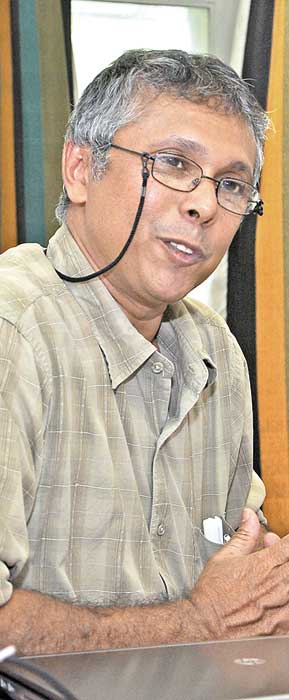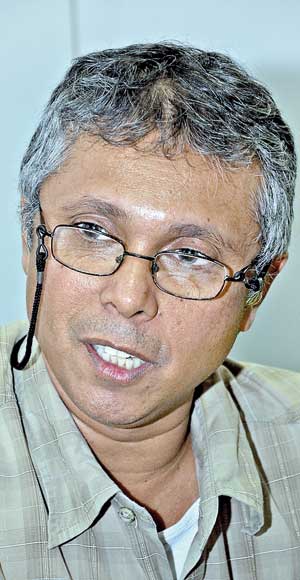Reply To:
Name - Reply Comment
Last Updated : 2024-04-24 11:58:00
.jpg)
_City-DM-9-IN.jpg) Political activist and former President of the Federation of University Teachers’ Association (FUTA), Dr. Nirmal Ranjith Dewasiri spoke to the on the revival of the FUTA campaign to win academics’ demands, the need to revisit the electoral political process in Sri Lanka and the reasons behind his decision to support the common candidacy of Maduluwawe Sobitha Thera.
Political activist and former President of the Federation of University Teachers’ Association (FUTA), Dr. Nirmal Ranjith Dewasiri spoke to the on the revival of the FUTA campaign to win academics’ demands, the need to revisit the electoral political process in Sri Lanka and the reasons behind his decision to support the common candidacy of Maduluwawe Sobitha Thera. .jpg) Do you believe the revival of the campaign to resolve academics’ grievances initiated with the June 3 token strike would make any difference, given the government discounted FUTA demands even after the three-month strike?
Do you believe the revival of the campaign to resolve academics’ grievances initiated with the June 3 token strike would make any difference, given the government discounted FUTA demands even after the three-month strike?.jpg) Do these letters sent by the Higher Education Ministry and the UGC contain specific assurances on when the decisions will be implemented or are they vague wordings?
Do these letters sent by the Higher Education Ministry and the UGC contain specific assurances on when the decisions will be implemented or are they vague wordings?(1)(4).jpg)
(1)(4).jpg)
.jpg) The government has adopted a non-responsive attitude to all TU action. Is this due to an issue in the governance system or flaws in TU movements?
The government has adopted a non-responsive attitude to all TU action. Is this due to an issue in the governance system or flaws in TU movements? bargaining power is much stronger in comparison to a few years ago. The problem we are facing is formidable; they are not trivial issues. Our grievances have gone beyond the ability of university administrators to resolve. So the lack of a response from the government in our case particularly is deeply linked to broader governance issues governing policies - both economic and social.
bargaining power is much stronger in comparison to a few years ago. The problem we are facing is formidable; they are not trivial issues. Our grievances have gone beyond the ability of university administrators to resolve. So the lack of a response from the government in our case particularly is deeply linked to broader governance issues governing policies - both economic and social..jpg) Public support for the ‘6% GDP allocation to education’ movement is still nominal. Do you think it’s a result of the lack of efficient awareness campaigns?
Public support for the ‘6% GDP allocation to education’ movement is still nominal. Do you think it’s a result of the lack of efficient awareness campaigns?.jpg) You stated at a media briefing recently when FUTA called off the strike in 2012, that they were well aware of being tricked. What reasons really prompted the decision to end the three-month strike? Did the intimidations against you and your family play a part in it?
You stated at a media briefing recently when FUTA called off the strike in 2012, that they were well aware of being tricked. What reasons really prompted the decision to end the three-month strike? Did the intimidations against you and your family play a part in it?.jpg) Reports have been circulating of the possibility of you being fielded as a common candidate?
Reports have been circulating of the possibility of you being fielded as a common candidate?.jpg) Would you consider joining electoral politics if an invitation was extended?
Would you consider joining electoral politics if an invitation was extended?(1)(4).jpg)
(1)(4).jpg)
.jpg) Are you being critical of electoral politics in the Sri Lankan context or as a global phenomenon?
Are you being critical of electoral politics in the Sri Lankan context or as a global phenomenon?.jpg) What has contributed to the deterioration of the transformative capability of electoral politics?
What has contributed to the deterioration of the transformative capability of electoral politics?.jpg) What are your reasons to support the candidacy of Sobhitha Thera? Do you believe he is capable of challenging the present regime?
What are your reasons to support the candidacy of Sobhitha Thera? Do you believe he is capable of challenging the present regime?.jpg) Religious tensions spurred on by extremist, nationalist movements are on the rise in Sri Lanka once more. Is it impossible to achieve peace and harmony in a society of ethnic diversity and religious pluralism?
Religious tensions spurred on by extremist, nationalist movements are on the rise in Sri Lanka once more. Is it impossible to achieve peace and harmony in a society of ethnic diversity and religious pluralism? contract.
contract..jpg) Discourse on Human Rights is being criticized by various parties as a tool deployed by the West to implement imperialistic agendas. It is also frequently used as an excuse to remain inactive on HR violations. What are your comments?
Discourse on Human Rights is being criticized by various parties as a tool deployed by the West to implement imperialistic agendas. It is also frequently used as an excuse to remain inactive on HR violations. What are your comments?.jpg) As of late, calls to abolish the Executive Presidency have been gaining grounds. Do you believe it would help address crises in the governance system?
As of late, calls to abolish the Executive Presidency have been gaining grounds. Do you believe it would help address crises in the governance system? (1)(4).jpg)
(1)(4).jpg)

Add comment
Comments will be edited (grammar, spelling and slang) and authorized at the discretion of Daily Mirror online. The website also has the right not to publish selected comments.
Reply To:
Name - Reply Comment
US authorities are currently reviewing the manifest of every cargo aboard MV
On March 26, a couple arriving from Thailand was arrested with 88 live animal
According to villagers from Naula-Moragolla out of 105 families 80 can afford
Is the situation in Sri Lanka so grim that locals harbour hope that they coul
23 minute ago
24 minute ago